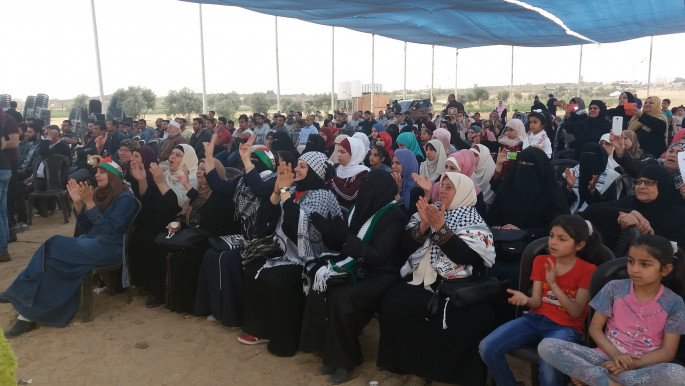Dabka dancing, singing and poetry: How Gazans protest
The Mallaka area is one of five key gathering spots near the 40 kilometre border fence between the Gaza Strip from Israel where protesters have been assembling.
Crowds of local Gaza residents have flowed here since the launch of the Great Return March on March 30.
The Dabka dance, known to every Palestinian, is a part of a programme of activities arranged by Great Return March organisers.
Read also: Gaza's Great Return March is only the beginning of a fresh wave demanding Palestinian rights
Among the performances, crowds were also entertained with storytelling, poetry recitals and singing.
Afnan Abu Mousa is one of three local poets awarded a special prize by the higher committee of the Great Return March. Under a newly erected plastic sheet-roofed hall, Afnan, a 25-year-old medical student from Gaza City, recited some of her own verses promoting the Palestinian people's right to return.
"My message goes only to the Zionist occupation; we Palestinians are steadfast in defending our inalienable right of return by all possible means at our disposal, including poetry and writing," Afnan told The New Arab, after having performed on stage.
"I feel really excited that I am here today, taking part in the Great Return March with my own way, which is poetry." The intermittent cracking of live ammunition being fired by Israeli troops provided a syncopated punctuation to our conversation.
 |
My message goes only to the Zionist occupation; we Palestinians are steadfast in defending our inalienable right of return by all possible means at our disposal, including poetry and writing |  |
As part of the performances on Thursday, days before the 70th anniversary of the Palestinian people's Nakba or "catastrophe", was eight-year-old Mohammad Basiony, whose songs included "I am standing on the border fence, with no fear".
"I feel very excited, for I am performing for Palestinian crowds in front of the Israeli border fence," Mohammad told The New Arab. "By means of my performance, I would say that we little Palestinians can understand what is meant by Awda - 'return'." Men and women alike applaud loudly and cheerfully for Mohammad's impressive voice.
Today's festivity comes as part of the Culture Palace's series of activities on Palestinian farmland, just metres from the Israeli border. The Culture Palace is a local non-governmental organisation, chaired by Attalah Abuelsebah, a former minister of culture in the Hamas-led government.
"Our presence here constitutes a clear message to the occupiers that Palestinians, who have among them poets, writers, singers and Dabka dancers, protest at the occupation in their own ways," he told The New Arab.
"We are also sending a message of non-violent rejection to the occupation. Our Culture Palace-run activities will continue through the upcoming days, until the 70th anniversary of the Palestinian people's Nakba on May 15."
Also in the Mallaka area is an exhibition of portraits and pictures of Palestinian life before the Palestinian Nakba and the creation of the state of Israel in 1948, as well as a political symposium over current political conditions.
 |
We are also sending a message of non-violent rejection to the occupation |  |
Attendees listen attentively while Salah Abdelaati, a prominent rights activist and one of the Great Return March organisers, speaks of the right of return, based on United Nations General Assembly resolution 194, which pertains to Palestinian refugees being allowed to go home to lands they were forced to leave either through violence or fear of violence as the state of Israel was created.
 |
|
| Palestinian women and children clap loudly as they watch performers [Rami Almeghari] |
"Over the past several weeks, we have been organising several activities including seminars, exhibitions and some other folklore sharing. We have also managed to train 700 youths, male and female, on how to engage in peaceful or non-violent protests," Abdelaati told The New Arab after his speech on Thursday.
Will the protests and related activities continue after May 15, the 70th anniversary of the Nakba? "This march of return will continue until there is a tangible positive change," said Abdelaati.
Twitter Post
|
"It is unfair that more than two million Palestinians in Gaza, remain hostage to a crippling Israeli siege that has turned the occupied Palestinian territory into the largest-ever prison on earth and in history."
The march's organising committee has arranged many such activities in five centres of protest, all along the length of the Gaza Strip.
The committee insists that the Great Return March remains peaceful, to counter widespread Israeli allegations that the march is violent - and thus requires an Israeli military response.
The Great Return March was launched on March 30, 2018, on the 32nd anniversary of Palestinian Land Day - an Israeli government confiscation of vast areas of farm lands from an Arab-Palestinian town, Sakhneen, back in 1976.
Since it began, the Israeli army has killed more than 45 Palestinians, wounded nearly 8,000 others, including more than 2,000 by live ammunition, according to the Gaza-based Palestinian health ministry.
Among those wounded, the ministry suggests, 1,942 have injuries in the lower parts of their bodies.
Read also: Gaza's shortage-stricken hospitals crumble under the Great Return March demand
As the 70th anniversary of the Palestinian Nakba is neary upon us, Palestinian refugees such as 65-year-old Om Mohammad Mhanna - from the historical Palestinian village of Masmiya - look forward to returning to their homeland.
"I swear, when I have been recently able to travel to occupied East Jerusalem, I felt a great deal of bitterness, just inside me, after having passed by my original village of Masmiya. I hope to remain alive, when the day of return comes."
Rami Almeghari is a Palestinian freelance journalist living and working in Gaza.
Follow him on Twitter: @writeralmeghari





 Follow the Middle East's top stories in English at The New Arab on Google News
Follow the Middle East's top stories in English at The New Arab on Google News


